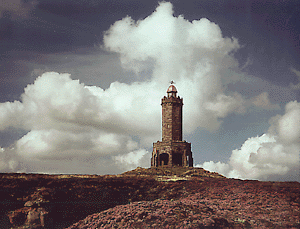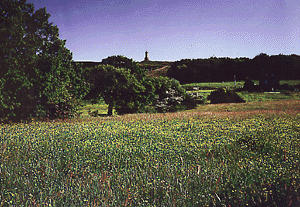Darwen formerly known as Over Darwen, now includes part of the former area known as
Lower Darwen, Pickup & Yate Bank and Eccleshill.
The imprint of history goes deeply at Darwen. The important road contrusted by the Romans nearly 2,000 years ago from Manchester to Ribchester and on to Carlisle and into Scotland, can be traced through the Borough along the hillside on the east of the town, being called Roman Road between Whittlestone Head and Blacksnape.
After the withdrawal of the Roman legions from Britain in the 5th century the defenceless country was overrun by Continental invaders who subsequently settled here. The derivation of various local place names, including that of the present town of Darwen confirms the fact that this district became occupied by the Saxons.
Following the Norman Conquest the de Lacy family was granted land and manoiral rights here in the latter part of the 11th century, the name of the place being recorded as Darwynd. The first reference to Darwen, and what is now Lower Darwen was in 1154 as the two Darwentas. The former place became known in 1280 as Superiore Derwent, which was recorded as Over Darwen forming part of the parish of Blackburn in 1616.
The earliest industries at Darwen were farming, quarrying and later coal mining; but the population of those days was coparitively small, being only a few hundred people. It is recorded at the begining of the 18th centuary that many of these were 'coal-getters', this improved form of fuel and industrial power being either cut from the near-surface seams or dug from pits.
The Wool Industry
The traditional textile trade also developed, with the workers spinning and weaving the cloth in their own homes both in the town and on the surrounding farms where much of the raw material was provided by the wool of the moorland sheep. The industry passed through various phases of relativel prosperity and depression as master weavers gained more and more control.
The merchandise which had originally been taken into surrounding town markets by the workers themselves was now sent by teams of packhorses, and the later by wagons. The master weavers took the enhanced profits of better marketing, paying their employed workers a low wage for long hours of labour, and housing them under crowded and far from pleasent conditions. Those who because of sickness or age could no longer put in the required amount of labour were all too often turned out of their homes.
The Coming of Cotton
With the Idustrail Revoluation of the 19th century hand looms were displaced by power looms, and work was concentrated in mills and facotires instead of in houses in the town. A greater ouptup with less labour resulted in considerable unemployment, and there were strikes and riots. Samuel Crompton, who is remembered as the inventor of the spinning mule, opened a mill at Darwen in 1812. There followed much unrest amongst the workers with considerable rioting in 1826 due to privation resulting from insufficient work.
The old packhorse routes, were now disused, fror turnpicke trusts had been set up to make good roads, the upkeep of these being paid for by the tolls levied on all traffic. A slower alternative freighrt transport was by canals. Then came the railways, the line between Bolton and Blackburn being opened in 1848. About this time the local paper-staining and wallpaer industry began to develop.
Practically all the woollen mills had now gone over to cotton; but the hard times of the 1820's were again experinced with even greater severity in the early 1860's when the American Civil War cut off all the supplies of raw cotton from the Southern States into the port of Liverpool. The distress in Darwen, as in all the other Lancashire cotton towns, now amounted to famine. The tragedy of these times, although a century ago, still lives on as a poignant memory.
Conditions subsequently imporoved with better working and living conditions and higher pay; but this great Lancashire industry has continued to fluctuate beween trade boons and recessions. Paper has been one of the town's major industries for more than a century. Other major industries include engeering, paints and plastics.
The town of Darwen lies in a valley to the South of Blackburn with the important A666
running through the centre of the town. The Jubilee Tower looks down on the town from the moors above. The best approach to the tower is from Sunnyhurst Woods. The woods offer a number of walks and nature trails and has a visitors centre with displays of art and local natural history The towns main industry today is in petrochemical and plastics but many mills and factories from last century still exist.
The most famous mill is the India Mill, built to mark the visit of Gandhi.
Darwen Countryside
At the gateway to the Lancashire hill country the Borough of Blackburn comprises two thirds
countryside - mostly open moorland with dramatic vistas, tranquil reservoirs, gentle farmland and wooded valleys.

This is walking country and whether it's a short stroll down a leafy lane, or a longer circular walk off the 32 mile Witton Weavers' Way, there's an opportunity to take life at your own pace and enjoy the great outdoors.

Darwen Tower, which in 1997 celebrated 100 years since building work commenced.
The town of Darwen has featured on BBC television as the home of private detective Hetty Wainthropp in the series "Hetty Wainthropp Investigates", starring Patricia Routledge. Filming for the series took place in the town and surrounding area.
Darwen offer everything you could want for that great day out or longer stay. With superb shopping, first class leisure facilities, interesting heritage and miles of dramatic moorland scenery - you'll find plenty of variety and a lot happening that's right up your street!
A warm welcome awaits the visitor and whether your stay is for business or pleasure - we look forward to seeing you soon!
Please Take a Moment To Sign My Guest Book And Let me Know Your Views
I am alway on the look out to add more things to my website to make it as helpful as possible, if you have a web page that you think may be of some interest to me or you have trouble accessing a site, Just E-mail me, and I'll check it out.
MAIL ME

This Page is always under Construction
Updated 15/3/99
BACK TO

HOME PAGE





HOME PAGE
